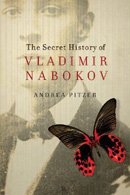Pnin, the Cremona Women’s Club, and Jewish refugees after the war
Nabokov was crazy for complex allusions, intentionally seeding his fiction with literary and historical references, from pop culture and epic poetry to both in a single line (see “Chapman’s Homer” from Pale Fire). But there are so many winks and nods and proper names in his books, sorting out what has coherence from what is […]
Nabokov and concentration camps, part II
During the course of writing The Secret History, I was staggered by the stories I heard from sources and translators whose family lives had been shaped in brutal ways by political prisons and concentration camps. Some, like Nabokov’s family, had fled Russia westward away from Revolution or pogroms, only to have to escape Germany or […]
Nabokov, concentration camps, and a century of civilian casualties
Vladimir Nabokov was born in 1899, less than three years after the first concentration camps were founded thousands of miles away in Cuba. What does Vladimir Nabokov—creator of decadent fiction and king of literary insults—have to do with concentration camps? It’s a reasonable question. Like Nabokov, concentration camps were born in the nineteenth century but […]
Why we need a Secret History of Vladimir Nabokov
Why focus on Nabokov? And why now? These are questions I’ve been asked by everyone from prospective publishers to strangers who have heard I’m writing a book. Because there was no shortage of drama in his life, stories about Nabokov have endless potential. He fled the aftermath of the Russian Revolution with Bolsheviks firing machine […]
